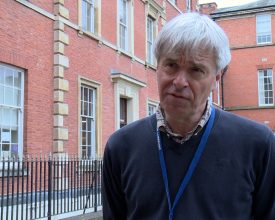Researchers are looking for people to form a new dementia singing group in Loughborough, to further study the effects of singing on people with dementia.
The experts at the University of Nottingham are looking for people with dementia, and their main carer, to join the weekly singing group for 10 weeks.

The transformative power of singing for people with dementia was brought to the public’s attention in the BBC documentary, ‘Our Dementia Choir with Vicky McClure’. People living with dementia came together to form a choir that has become a national sensation, performing at the Splendour Festival in 2022 and 2023. Their experiences showed the power of music to improve the lives and wellbeing of people with dementia.
Study of online singing groups conducted by the university during the Covid-19 pandemic explored how this shared activity can support wellbeing during a time of social isolation. Now, this year’s study will allow for further research to examine the effects of group singing on the quality of life of people recently diagnosed with dementia, and the relationship between them and their carer.
The singing groups will be fun, informal and no singing experience is necessary. The singing sessions are planned to be hosted at The MMC, Mountsorrel on Monday afternoons.
Dr Justine Schneider, Professor of Mental Health and Social Care at the University of Nottingham, is leading the study. “Most people with dementia are likely to spend years of their lives with a relative or close friend as their principal carer. There is a shortage of effective therapeutic interventions to people in this situation, but singing is popular, accessible to most people and relatively inexpensive to deliver at scale,” she said.
“The logic of its effect is that the social, emotional, and physiological stimulation helps to maintain mental functioning; an enjoyable shared experience may strengthen the caring relationship; participation can give access to information, advice and peer support, particularly for the carers; and long-term care may be delayed, with consequent savings to the state while meeting the preferences of most people with dementia to remain at home as long as possible.”
Researchers will use questionnaires to collect information about quality of life, mood, cognition, and the relationship between care partners. They will also talk to people who attend the singing groups and observe sessions, to understand how people take part, what they get from it and whether they experience physical or mental changes over time.
Dr Schneider said: “People who attend singing groups tell us that they enjoy the music and getting out. Meeting people in a similar situation is an added bonus, some say. Still, we do not know whether regular participation in singing sessions makes a measurable difference to people’s experience of dementia or their survival in the community. Moreover, there are many people who do not have access, due to lack of funding, as well as the lack of hard evidence to justify investment in this intervention. This study will help to remedy that.
For further information or to participate email: preside.research@nottingham.ac.uk or call 07771843199.






